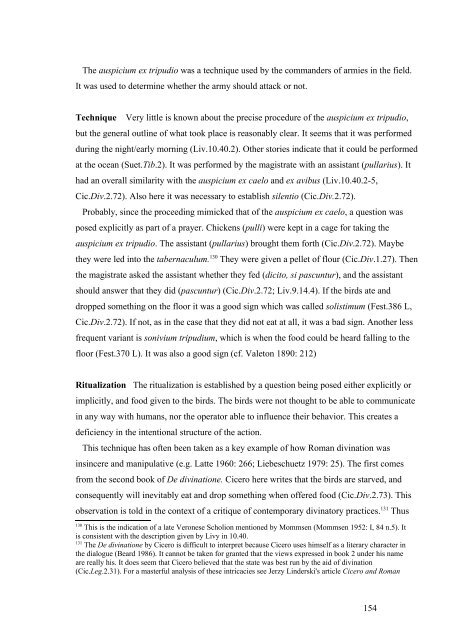The dissemination of divination in roman republican times
The dissemination of divination in roman republican times
The dissemination of divination in roman republican times
You also want an ePaper? Increase the reach of your titles
YUMPU automatically turns print PDFs into web optimized ePapers that Google loves.
<strong>The</strong> auspicium ex tripudio was a technique used by the commanders <strong>of</strong> armies <strong>in</strong> the field.<br />
It was used to determ<strong>in</strong>e whether the army should attack or not.<br />
Technique Very little is known about the precise procedure <strong>of</strong> the auspicium ex tripudio,<br />
but the general outl<strong>in</strong>e <strong>of</strong> what took place is reasonably clear. It seems that it was performed<br />
dur<strong>in</strong>g the night/early morn<strong>in</strong>g (Liv.10.40.2). Other stories <strong>in</strong>dicate that it could be performed<br />
at the ocean (Suet.Tib.2). It was performed by the magistrate with an assistant (pullarius). It<br />
had an overall similarity with the auspicium ex caelo and ex avibus (Liv.10.40.2-5,<br />
Cic.Div.2.72). Also here it was necessary to establish silentio (Cic.Div.2.72).<br />
Probably, s<strong>in</strong>ce the proceed<strong>in</strong>g mimicked that <strong>of</strong> the auspicium ex caelo, a question was<br />
posed explicitly as part <strong>of</strong> a prayer. Chickens (pulli) were kept <strong>in</strong> a cage for tak<strong>in</strong>g the<br />
auspicium ex tripudio. <strong>The</strong> assistant (pullarius) brought them forth (Cic.Div.2.72). Maybe<br />
they were led <strong>in</strong>to the tabernaculum. 130 <strong>The</strong>y were given a pellet <strong>of</strong> flour (Cic.Div.1.27). <strong>The</strong>n<br />
the magistrate asked the assistant whether they fed (dicito, si pascuntur), and the assistant<br />
should answer that they did (pascuntur) (Cic.Div.2.72; Liv.9.14.4). If the birds ate and<br />
dropped someth<strong>in</strong>g on the floor it was a good sign which was called solistimum (Fest.386 L,<br />
Cic.Div.2.72). If not, as <strong>in</strong> the case that they did not eat at all, it was a bad sign. Another less<br />
frequent variant is sonivium tripudium, which is when the food could be heard fall<strong>in</strong>g to the<br />
floor (Fest.370 L). It was also a good sign (cf. Valeton 1890: 212)<br />
Ritualization <strong>The</strong> ritualization is established by a question be<strong>in</strong>g posed either explicitly or<br />
implicitly, and food given to the birds. <strong>The</strong> birds were not thought to be able to communicate<br />
<strong>in</strong> any way with humans, nor the operator able to <strong>in</strong>fluence their behavior. This creates a<br />
deficiency <strong>in</strong> the <strong>in</strong>tentional structure <strong>of</strong> the action.<br />
This technique has <strong>of</strong>ten been taken as a key example <strong>of</strong> how Roman <strong>div<strong>in</strong>ation</strong> was<br />
<strong>in</strong>s<strong>in</strong>cere and manipulative (e.g. Latte 1960: 266; Liebeschuetz 1979: 25). <strong>The</strong> first comes<br />
from the second book <strong>of</strong> De <strong>div<strong>in</strong>ation</strong>e. Cicero here writes that the birds are starved, and<br />
consequently will <strong>in</strong>evitably eat and drop someth<strong>in</strong>g when <strong>of</strong>fered food (Cic.Div.2.73). This<br />
observation is told <strong>in</strong> the context <strong>of</strong> a critique <strong>of</strong> contemporary div<strong>in</strong>atory practices. 131 Thus<br />
130 This is the <strong>in</strong>dication <strong>of</strong> a late Veronese Scholion mentioned by Mommsen (Mommsen 1952: I, 84 n.5). It<br />
is consistent with the description given by Livy <strong>in</strong> 10.40.<br />
131 <strong>The</strong> De <strong>div<strong>in</strong>ation</strong>e by Cicero is difficult to <strong>in</strong>terpret because Cicero uses himself as a literary character <strong>in</strong><br />
the dialogue (Beard 1986). It cannot be taken for granted that the views expressed <strong>in</strong> book 2 under his name<br />
are really his. It does seem that Cicero believed that the state was best run by the aid <strong>of</strong> <strong>div<strong>in</strong>ation</strong><br />
(Cic.Leg.2.31). For a masterful analysis <strong>of</strong> these <strong>in</strong>tricacies see Jerzy L<strong>in</strong>derski's article Cicero and Roman<br />
154


